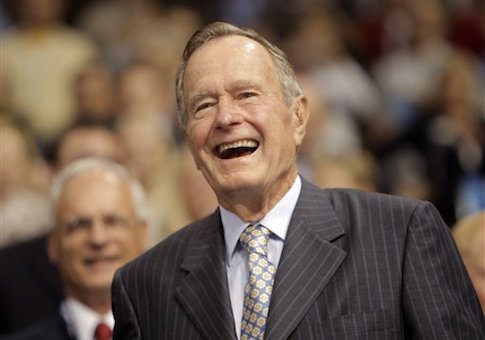In The Quiet Man, John Sununu, former governor of New Hampshire, writes affectionately of the presidency of George HW Bush. As Bush’s chief of staff, Sununu was with the president for all of the significant moments of his consequential term in office. Though admittedly biased, this assessment of Mr. Bush’s record is made worthwhile by the new details it brings to old stories.
Unlike some books on the presidency of Bush the Elder, Sununu’s work spends substantial time on domestic policy, including the complex negotiations prior to the Clean Air Act and the contentious budget agreement of 1990. On the Clean Air Act, he offers an attractive template for conservative engagement with environmental issues. After all, environmental policy doesn’t—as many liberals now seem to believe—begin and end with global warming and carbon taxes.
On the 1990 budget, Sununu argues that Bush’s decision to accept higher taxes was the only choice for a responsible president. As he puts it, ''George Bush, in agreeing to the Democrats’ demands for new taxes, did what was required for the good of the country instead of what was politically expedient for him personally.'' Sununu is at pains to point out that the legacy that Reagan bequeathed to Bush was mixed. While the Soviet Union was crumbling and taxes were lower, the federal deficit was also exploding. In Sununu’s view, Bush had to address this reality, and he is fiercely critical of Newt Gingrich, then the House Minority Whip, for what he regards as Gingrich’s betrayal of Bush over the budget process. And as our long national journey with the Clinton family reminds us every day, it was Bush’s acquiescence to these higher taxes that greatly damaged him during the 1992 campaign.
Sununu also offers rich detail on the various landmark accomplishments that define HW Bush’s foreign policy legacy. While much of this material has been covered in other books, Sununu’s description of President Bush’s diplomacy is well worth reading. Outlining Bush’s placation of the notoriously difficult French president, Francois Mitterrand, Sununu explains how Bush guided Europe into supporting the U.S.-led plan for German reunification (which, as Stephen Sestanovich has noted, was no easy task). Sununu also shows the crucial importance of Bush’s diplomacy in the Middle East. Reaching out to the Sunni-Arab monarchies and reassuring them of American resolve, Bush was able to forge a great coalition against Saddam Hussein, while restraining the paranoid impulses of those leaders. A truly skilled diplomat, Bush travelled the region to show physical commitment to the security of American allies. In doing so he earned trust and reciprocal foreign policy support. This is an example to which President Obama would do well to pay heed.
Sununu also accounts for the careful management of the Soviet Union’s decline. Recognizing the risks Gorbachev faced in terms of losing face, Bush patiently built trust with the Soviet leader and brought him into concert with a new American-led international order. We’re left with the impression—in my opinion accurate—that had Bush not been so skilled in this relationship management, the Soviet Union might well have retrenched immediately into a Putin-style aggression as it collapsed. Instead, a peace dividend, however brief, followed—one of many advantageous developments that Mr. Bush granted to President Bill Clinton.
This book isn’t perfect, and it has the share of score-settling typical of its genre: Sununu’s feeling towards the D.C. press corps is best described as "unrestrained hatred." Nevertheless, by The Quiet Man’s conclusion, readers will be convinced of Sununu’s central thesis, that ''George Bush was never one to shrink from formidable challenges—even when confronting them meant great personal cost.''
Splitting his book into various chapters on Bush’s record, Sununu begins by giving the reader a background to his relationship with HW Bush. And recounting short exchanges between the president and himself, Sununu’s passion for his boss is evident: Sununu fervently believed in Bush from the beginning of his term, at the end of his term, and still believes in him today. While some of Sununu’s stories are a little repetitive, they reinforce our understanding of HW’s identity as a decent, honorable man committed to the nation’s interests first. In today’s political environment—one in which the public is deeply mistrustful of politicians and politics—Sununu’s accountable respect for George HW Bush is a tonic for our cynicism.
But The Quiet Man isn’t just an emotional homage. It’s a detailed recording of history.
